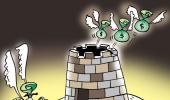Liquidity has improved, but 20 out of 24 NBFC stocks are staring at an over 5% reduction in 12-month target prices.
Illustration: Uttam Ghosh/Rediff.com

Going by news reports, there’s an on ground improvement in the operating climate for non-banking finance companies (NBFCs).
Companies are lately speaking about easing of liquidity squeeze, helping cost of funds incrementally soften from the peak of November 2018.
Yet, the Street doesn’t seem to be pleased with these bettering parameters.
Going by a Bloomberg poll of analysts, nearly 22 out of 24 NBFC stocks are faced with a continued downgrade in their 12-month target prices and over 20 of them have seen a sharper downgrade in likely price appreciation (target prices) in the past six months.
While troubled names such as Dewan Housing Finance has seen a 43 per cent downgrade in its 12-month target price compared to target prices set in September 2018 when the liquidity crisis broke out for the NBFC sector, its larger peer Indiabulls Housing Finance (despite its proposed merger with Lakshmi Vilas Bank) has seen its target price being lowered by over 20 per cent.
Even names such as LIC Housing Finance, M&M Financial Services and Shriram Transport Finance, which are perceived as less riskier NBFC stocks, have also seen a 5 – 15 per cent cut in their target prices.
PNB Housing’s is down by 28 per cent.
Interestingly, despite the market leader - HDFC Limited, recently scaling to a new high, analysts remain pessimistic on the potential upside that the stock can offer in the next 12 months.
With nearly a per cent cut in expectations vis-a-vis September 2018 levels, HDFC and Bajaj Finserv too haven’t been spared by the Street.
Interestingly, Bajaj Finance and Muthoot Finance are the only two stocks to witness upgrades in price expectation during this period.
Explaining the reason behind the Street’s continued pessimism on the sector, Shweta Daptardar, analyst at Prabhudas Lilladher says with growth likely to moderate substantially from over 20 per cent mark, valuations and price expectations too will accordingly change.
“When there has been a reset in the liability structure, asset structure will also change,” she adds.
A recent report by JP Morgan notes that funding cost and availability is likely to challenge both margins and growth in FY20 for the sector at large.
“Banks, especially government-owned ones will likely be the main providers of liquidity to NBFCs and securitisation is increasingly becoming a key driver of liability strategy,” the report adds.
For housing finance companies in particular, Rajiv Mehta, analyst at Yes Securities, says that the worst outcome for the industry could be to change their business model from ‘originate-to-hold’ to ‘originate-to-sell’ (loan) model, which could impact their profitability besides increasing volatility in their financials.
With these concerns taking the centre stage, the Street is also far from regaining its old optimism on the sector.
Underlying demand for loans in key segments such as housing, passenger and commercial vehicles and consumer durables will also be an important factor to watch out for in the coming quarter.
A pronounced slowdown may hurt asset quality and profitability of NBFCs in addition to impacting growth in the coming quarters.
For now, those at UBS Securities feel that only the pace of loan growth may moderate from 19 per cent in FY16-18 to 13 per cent for NBFCs and 14 per cent for HFCs in FY18-21, while they remain positive on profitability and asset quality.
Considering the uncertainties around the sector, analysts too are positive only on the large sector leaders - Bajaj Finance and HDFC.
That said, at current levels, their stocks do not leave much near-term upside.












 © 2025
© 2025